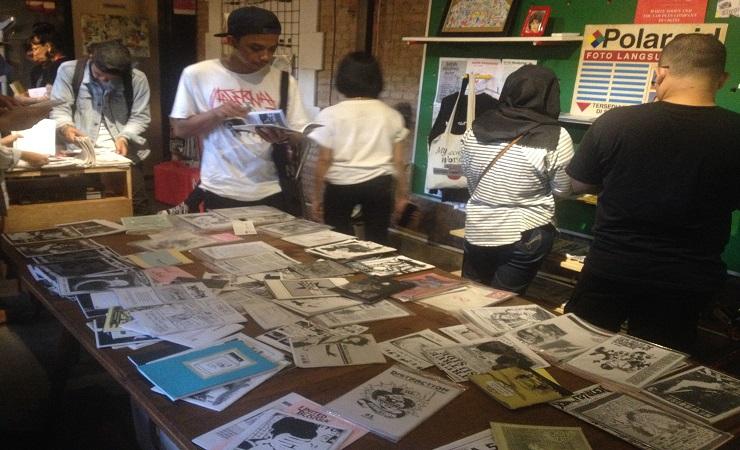ASIACALLING
Indonesia’s ‘zine scene’ flourishing in Bandung
"Scissors, paper and glue hardly seem like radical materials. But there’s a vibrant zine scene in Java, where diverse ideas are making their way into the world with a few humble materials. "

Scissors, paper and
glue – they hardly seem like radical materials.
But as our reporter discovered, there’s a vibrant ‘zine scene’ in Java, where all sorts of interesting and diverse and ideas are making their way into the world with just a few humble materials.
From the Indonesian city of Bandung, Nicole Curby has more.
Just hours from Jakarta, Bandung is a creative capital of Java.
On a quiet street and through a rabbit warren of corridors, the walls lines with peeling paint, I eventually make my way into a big room in a warehouse filled with punks, artists and music.
This is an event for people who make zines, love zines, and want to learn more about zines.
Zine makers from all over Indonesia have come here for Bandung's third Zine Fest.
Rian, a photographer and zine maker from Depok, a city in West Java, explained that a zine is a printed publication.
“It may be not that serious, but some of them are very serious, some of them deal with life. We visualize. Sometimes we use text, pictures, photographs, drawing,” he said.
Tables are lined with homemade, photocopied curiosities.
![]()
Makers and lovers of this DIY craft have come to swap, sell and gift their creations, for one day only.
Zine maker and distributor from South Jakarta, Ika Vantiani, explained how she makes zines.
“Most of my zines I make with my own hands. Paper, glue, and scissors. And that’s the all the materials and tools that I use.”
Because they are cheap to make – usually just requiring the cost of photocopying – and because they are self-published, zines provide the opportunity to write and draw about anything.
Ika told me that she first discovered zines 16 years ago, and never looked back.
“One night, at the back of my friend’s car, he just got back from Bandung, and in his car there’s this zine, and I saw that and I said to myself oh, this is interesting, I would never think that I can do this, or am allowed to do this, to publish my own writings, share my own opinions,” Ika recalled.
“But the night I saw that first zine, that truly gave me enlightenment that it is actually okay. I can talk about this, and I actually can publish my own media and my own zines. This is something I’ve always wanted to do, so why don’t I do it myself?”
Ika published her first zine in 2000.
![]()
Zines are full of the things that would never be printed elsewhere.
I walked away with a zine with a red cover, all about periods, and women writing about their own bodies. A zine about sneezing, complete with sketches of people mid-sneeze. Political writings, and very personal confessions.
Some are works of art, others are rough scribbles, some combine with CDs and music.
Musician and zine maker Kartika Jahja has seen zines come a long way from the day that she was first introduced to them.
“It was all cut and paste photocopy, but now people are making lots of different kinds of zines and it’s a lot more diverse,” she says.
As one of the first women to start making zines in Indonesia, Ika Vantiani agrees, that over the years, the zine scene has evolved massively since 2000.
One thing is that these days there’s a lot more women involved.
“I feel like before, it was only was the official media of hard core punk kids. It feels like if you’re not hard core punk, you’re not allowed to make one. But actually it’s not, everyone could and should make their own zine,” Ika told me.
“I’m glad that now I see this variety of people who make their own zines, in whatever medium, with whatever message, in whatever creative expressions and executions they want, it’s super awesome. I’m really happy about it.”
![]()
And even while social media and the internet have saturated every corner of the globe, zines still have a special place, says Bandung Zine Fest organiser, Deden Erwin Suherman.
“People still choose zines because they are free with them. There aren’t any rules for how to make a zine, they’re free. There’s no deadlines, nothing. You don’t need much money. There’s no censorship or anything,” explained Deden.
Zines are an alternative to mainstream media, and can be printed and distributed widely, Deden said.
Creating one is something we all have the capacity to do, says Ika.
“Everybody should once in their lifetime experience what it feels like to make a zine with their hands, so that you know that you have the capacity to actually become the media, to actually publish media, not only own receiving media, the way they feed you everyday.”
- Bandung Zine Fest
- Deden Erwin Suherman
- Ika Vantiani
- Kartika Jahja
- Nicole Curby
Komentar (0)
KBR percaya pembaca situs ini adalah orang-orang yang cerdas dan terpelajar. Karena itu mari kita gunakan kata-kata yang santun di dalam kolom komentar ini. Kalimat yang sopan, menjauhi prasangka SARA (suku, agama, ras dan antargolongan), pasti akan lebih didengar. Yuk, kita praktikkan!